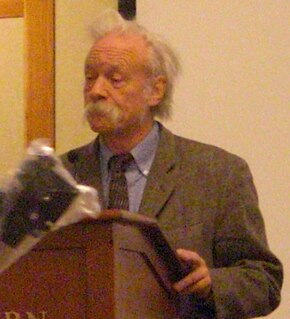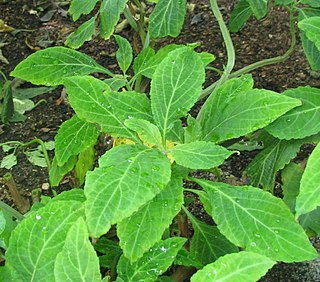The topic of this article may not meet Wikipedia's general notability guideline .(January 2018) (Learn how and when to remove this template message) |
This article may rely excessively on sources too closely associated with the subject, potentially preventing the article from being verifiable and neutral.(January 2018) (Learn how and when to remove this template message) |
Sacrament of Transition is a new religious movement based in Slovenia, [1] based on and promoting the sacramental use of the psychoactive plant Tabernanthe iboga and its psychoactive chemical constituent ibogaine. The founder of Sacrament of Transition is Marko Resinovic. The organization routinely sponsors psychedelic-related conferences and meetings. [2] [3] [4]

A new religious movement (NRM), also known as a new religion or alternative spirituality, is a religious or spiritual group that has modern origins and is peripheral to its society's dominant religious culture. NRMs can be novel in origin or part of a wider religion, in which case they are distinct from pre-existing denominations. Some NRMs deal with the challenges posed by the modernizing world by embracing individualism, whereas others seek tightly knit collective means. Scholars have estimated that NRMs now number in the tens of thousands worldwide, with most of their members living in Asia and Africa. Most have only a few members, some have thousands, and a few have more than a million members.

Slovenia, officially the Republic of Slovenia, is a sovereign state located in southern Central Europe at a crossroads of important European cultural and trade routes. It is bordered by Italy to the west, Austria to the north, Hungary to the northeast, Croatia to the southeast, and the Adriatic Sea to the southwest. It covers 20,273 square kilometers (7,827 sq mi) and has a population of 2.07 million. One of the successor states of the former Yugoslavia, Slovenia is a parliamentary republic and a member of the United Nations, of the European Union, and of NATO. The capital and largest city is Ljubljana.

A sacrament is a Christian rite recognized as of particular importance and significance. There are various views on the existence and meaning of such rites. Many Christians consider the sacraments to be a visible symbol of the reality of God, as well as a means by which God enacts his grace. Many denominations, including the Catholic, Anglican, Lutheran, Methodist, and Reformed, hold to the definition of sacrament formulated by Augustine of Hippo: an outward sign of an inward grace that has been instituted by Jesus Christ. Sacraments signify God's grace in a way that is outwardly observable to the participant.
Sacrament of Transition has representatives from activist organizations such as the Students for Sensible Drug Policy and Million Marijuana March. Other affiliates include Patrick K. Kroupa, whom the group has made a high priest, and Dana Beal, founder of Cures Not Wars, the North American Apostolic Delegate. Discussing addiction and his ibogaine use at the Chapel of Sacred Mirrors in early 2006, Kroupa said that while psychedelics such as LSD might allow a user to become aware of the damage his addiction was doing, "The flesh doesn't let you forget... But with ibogaine, the Light comes back down with you." The Sacrament of Transition actively proselytizes to heroin addicts with the message that ibogaine can help them. Besides the use of ibogaine as a sacrament, the Sacrament of Transition remains a heterodox body, with no other disclosed dogmas. Beal has maintained that Jesus consumed a mixture of ibogaine, Syrian rue, and cannabis during the Last Supper and the Passion.

Students for Sensible Drug Policy (SSDP) is an international non-profit advocacy and education organization based in Washington D.C. SSDP is focused on reforming drug policy in the United States and internationally. SSDP is the only international network of students dedicated to ending the war on drugs. At its heart, SSDP is a grassroots organization, led by a student-run Board of Directors. SSDP creates change by bringing young people together and creating safe spaces for students of all political and ideological stripes to have honest conversations about drugs and drug policy. Founded in 1998, SSDP comprises thousands of members at hundreds of campuses in countries around the globe.
Patrick Karel Kroupa is an American writer, hacker and activist. Kroupa was a member of the legendary Legion of Doom and Cult of the Dead Cow hacker groups and co-founded MindVox in 1991, with Bruce Fancher. He was a heroin addict from age 14 to 30 and got clean through the use of the hallucinogenic drug ibogaine.

Irvin Dana Beal is an American social and political activist, best known for his efforts to legalize marijuana and to promote the benefits of Ibogaine as an addiction treatment. He is a long-term activist in the Youth International Party (Yippies). He founded the Yipster Times in 1972.









